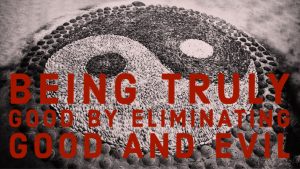By Cathy Eck
Understanding psychological reversal is key to freeing our mind. We’re all psychologically reversed in the areas of our life that don’t work perfectly.
What’s Psychological Reversal?
Years ago, I took a muscle testing class. There was one woman in the class that creeped me out. Lucky me; the instructor paired me with this creepy woman. I was going to discover why she felt creepy.
When I asked her to think of a happy time, her arm went limp; she looked sad. Then I asked her to think of a negative event in her life; she smiled brightly and got as strong as a bull. I was sure I was doing something wrong; so I called over the instructor. He said, “No you’re doing everything right. This woman has extreme psychological reversal. She gets strong in painful situations and weak when things are going well.”
Well I’ll be damned. I never thought such a thing existed. Then I realized that I’d seen mild cases of this all my life. People who “shine in a crisis” or “smile while they suffer” are common. Often, we label them heroes.
Psychological Reversal Begins…
My son was scared as hell on his first roller coaster ride. At the time, I didn’t know about letting go. I remember watching his mind work. He was feeling strong fear, and he was trying to sooth the emotion with words like, “This roller coaster is reliable. Others have ridden on it and lived.” In that moment, I saw this normal thought pattern as backwards, false, and ineffective.
In hindsight, I should have asked him to dive into the fear and find the causal belief. He would have let the cause go. Then he would have ridden on the roller coaster with a calm joyousness.
We’re all highly trained to sooth, suppress, or numb emotions, and we resist going back and releasing the causal belief. Our training keeps our false self in tact. To end psychological reversal, we must break the normal pattern of thought. The psychologically reversed mind views emotions as proof that their thinking is true. It’s masterful at soothing the emotions with more thought.
Soothing fixes the problem for now. Shining in a crisis fixes the problem in the moment. But it doesn’t fix the causal belief. Eventually, we’ll be soothing and shining again. If we have deep psychological reversal and feel pride in our ability to shine in a crisis, we’ll never remove the causal thought. We’ll fear losing our false purpose and superiority.
When we are not psychologically reversed, we notice that a thought doesn’t feel good, and we drop it. Healthy, successful people do this naturally all the time. Usually, they don’t even notice that they do it.
The Illusion Needs Psychological Reversal
Psychological reversal is key to making good soldiers, good slaves, and good subordinates. Feminine roles in the illusion are about obedience and following. The True Self can’t obey or follow someone who isn’t authentic, truthful, and loving (the true masculine). The true feminine is about creativity, inspiration, and wisdom.
When we make followers the good children or decorate soldiers for following orders, we create psychological reversals that are nearly impossible to break. We create people who ignore their True Self and obey authority because they’re proud of being false selves. We create people who willingly accept feminine roles that lead to their demise, destruction, or death.
The false self of psychologically reversed people will fight to the death to make sure the True Self isn’t exposed because it fears annihilation. The True Self is the enemy in psychological reversal because it won’t follow that which is false — it won’t obey false authority. It questions them!
If we’re stuck and emotion isn’t moving or our body isn’t healing, the cause is often found in the emotions that we label positive. Pride, excitement, romance, and hope are all emotions that are labeled positive. However, emotions are neither positive or negative. They’re just a signal that we’re thinking something false. The emotions are a warning that we need to let go.
An Example
Client: My mother was abusive to me; I can’t forgive her.
Coach: How does that feel when you think it?
Client: Terrible
Coach: So is it true?
Client: Yes, it’s true. She beat me.
Coach: It was your reality in the past. But you aren’t being beaten now. Your emotion right now is caused by labeling your mother abusive. Labels aren’t true so they feel bad when we think them.
Client: But it’s true. She abused me.
Coach: Her false self abused you. In the past, you met her at her false self because you believed something that allowed her to abuse you. She probably told you that you were bad and deserved punishment, and you believed her because she was your authority. Then she delivered punishment.
Client: Yes, she said I was a wise ass; I needed it beaten out of me.
Coach: Are you a wise ass?
Client: She thought I was. I was speaking what I saw; she didn’t like what I said.
Coach: So you were exposing reality that she wanted to hide.
Client: Yes, that’s it.
Coach: Does it feel good to keep the label wise ass?
Client: Kind of.
Coach: You’re proud of wise ass, but it isn’t the truth of who you are. It didn’t feel good when she labeled you wise ass. So let it go.
Client let’s go, and she realizes that her mother is no longer abusive so she’s not a victim anymore. She’s no longer holding on to her label of wise ass. Her pride in being a victim and being a wise ass has disappeared. Her psychological reversal is gone.
Her mind is now seeing the whole picture clearly, and she is calm. She realizes that she was only abused because she fell out of her True Self when she believed her mother. Now she is truly wise; and it couldn’t ever happen again.

